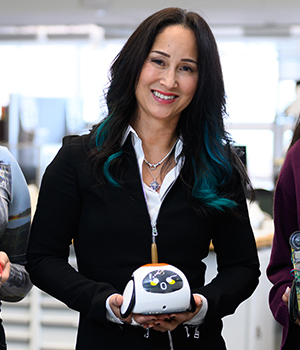
Cynthia Breazeal
(she/her)
MIT Media Lab
Evolving leadership systems
Cynthia Breazeal is a published author, international award winner, entrepreneur, and thought leader. Even so, some might argue that her most significant achievements lie in her extensive track record of mentorship and teaching, particularly her dedication to her research group.
Breazeal is a professor of media arts and sciences at MIT, where she founded and directs the Personal Robots group at the MIT Media Lab. She is also the MIT dean for digital learning, leading Open Learning’s units for business as well as research & engagement. Breazeal is a pioneer of social robotics and human-robot interaction, and her research group investigates social robot applications in education, pediatrics, health and wellness, and aging.
Taking a chance on students
Breazeal’s focus on taking multidisciplinary approaches to her research has resulted in an inclusive and supportive lab environment. Moreover, she does not shy away from taking students with unconventional backgrounds.
One nominator joined Breazeal’s lab as a design researcher in 2017 without a computer science background. However, Breazeal recognized the value of their work within the context of her lab’s research directions. “I was a bit of an oddball in the group”, the nominator modestly recounts, “but had joined to help make the work in the group more human-centered.”
Following this, Breazeal welcomed them into the PhD program in 2019. Throughout their academic journey, Breazeal offered unwavering support, whether by connecting them with experts to solve specific problems or guiding them through the academic job search process.
Evolving leadership systems
Over the Covid pandemic, Breazeal prioritized gathering student feedback through a survey about how she could best support her research group. In response to this input, Breazeal established the Senior Research Team (SRT) within her group.
The SRT includes PhD holders such as postdocs and research scientists who provide personalized mentorship to one or two graduate students per semester. The SRT members serve as dedicated advocates and points of contact, with weekly check-ins to address questions within the lab. Additionally, SRT members meet by themselves weekly to discuss student concerns and bring up urgent issues with Breazeal directly. Lastly, students can sign up for meetings with Breazeal and participate in paper review sessions with her and co-authors.
This new organizational system has enhanced cohesion and support within the group, creating a more interactive and supportive environment for students. Breazeal also mentions that the system provides mentorship training for postdocs and research scientists in the group. More importantly, one nominator sees this as an example of Breazeal’s commitment to the well-being and academic success of her students.
In the nominator’s opinion, this new system was implemented because Breazeal cares about her students and her lab culture. With over 30 members in her group, Breazeal cannot provide hands-on support for everyone daily, but she still deeply cares about each person’s experience in the lab. The nominator shared that Breazeal “understands as she progresses in her career, she needs to make sure that she is changing and creating new systems for her research group to continue to operate smoothly.”
